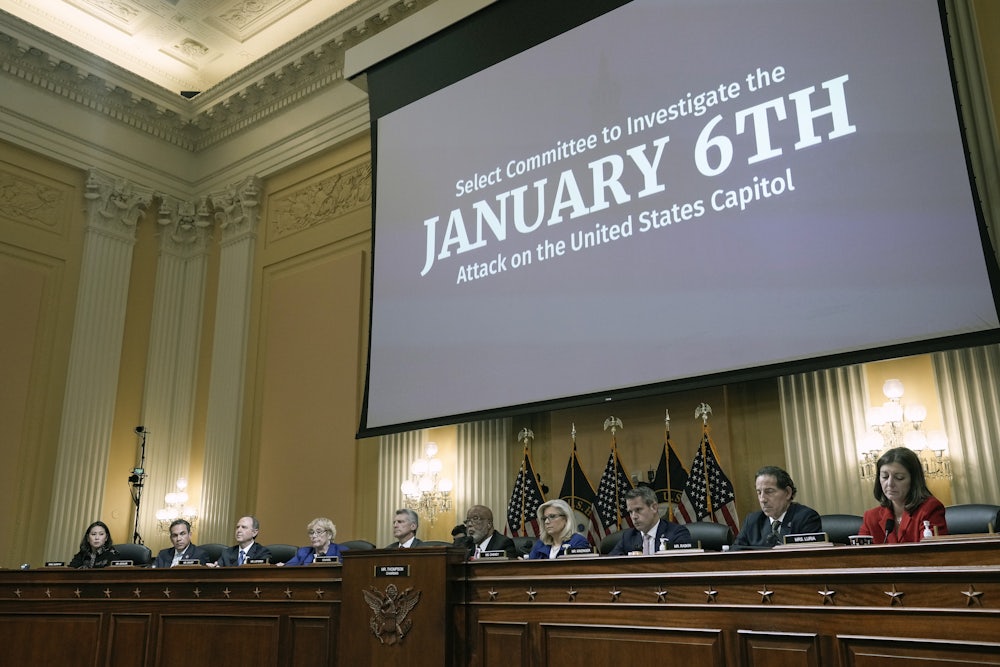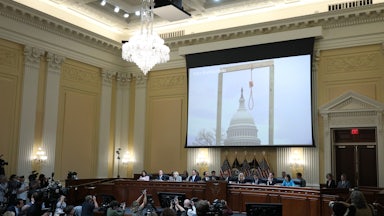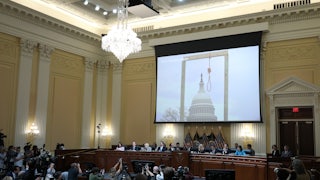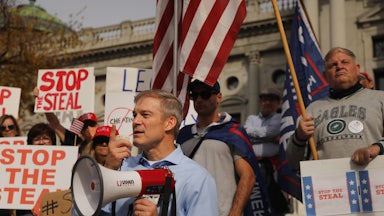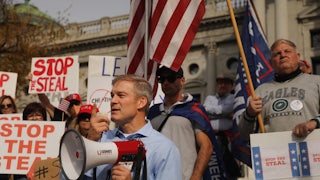Nearly two years after the insurrection that begat its creation, the Select Committee to Investigate the January 6th Attack on the United States Capitol put on one last demonstration of its ability to surprise. It has voted to subpoena former President Donald Trump for his role in efforts to overturn the 2020 presidential election.
The meeting on Thursday was the committee’s final planned public hearing. It was expected to be a presentation of closing arguments, of sorts—the braiding together of the committee’s investigative threads, the summarizing of overarching conclusions, and the issuing of another dire warning that Trump and his supporters still pose a danger, and are continuing to subvert the democratic process. As with previous public hearings, the committee assembled in a large, beaux arts committee room, chandeliers hanging from the ceiling and white-painted pillars inlaid into a butter yellow wall. Today, the rest of Capitol Hill was empty; Congress is out of session until November. Only the hearing room was abuzz; filled with reporters and guests, camera operators, and on and off-duty police officers surveying the scene.
The atmosphere was somber, but not tense; as committee members outlined their summarizing arguments, the quiet clicking of reporters’ keyboards was audible behind the presentations. The hearing room was dotted with familiar faces—including the police officers who had testified in the committee’s first ever public hearing more than a year ago, as well as the family members of officers who died as a result of their injuries on January 6. These guests have attended each of the committee’s public hearings since June.
When committee Chairman Bennie Thompson announced that this would not be a hearing, but a business meeting during which steps could be taken to advance the investigation, it came as a surprise. Roughly an hour into the meeting, NBC News first reported that the former president would be subpoenaed, upending expectations.
The vote capped two and a half hours of member statements and video testimony. The chorus of “ayes” from the nine committee members approving the resolution to subpoena Trump rang out in the otherwise silent hearing room. Despite the unanimity of the vote, Vice Chair Liz Cheney still called for a roll-call tally for posterity, and each member once more solemnly cast their “aye” vote individually. The grim determination of the committee was palpable as they took their final vote, and all seemed aware that this was a culmination of a larger argument they’d endeavored to prove to the American people: that the president personally encouraged the riot at the Capitol.
“He tried to take away the voice of the American people and replace the will of the voters with his will to remain in power. He is the one person in the center of the story of what happened on January 6,” Thompson said of Trump ahead of the vote on the subpoena, which he characterized as a “serious and extraordinary action.” “He must be accountable. He is required to answer for his actions.”
In all likelihood, the committee’s unanimous vote will not convince Trump to come before the committee to answer questions, although it did prompt a scathing response from the former president on his bespoke social media site. “Why didn’t the Unselect Committee ask me to testify months ago? Why did they wait until the very end, the final moments of their last meeting?” Trump wondered in a Truth Social post. “Because the committee is a total ‘BUST’ that has only served to further divide our Country which, by the way, is doing very badly—A laughing stock all over the world?”
Nonetheless, Representative Jamie Raskin insisted that the vote had not been symbolic, and brushed off hypotheticals about litigation Trump may bring to challenge the subpoena. “It’s hard for me to imagine any American citizen being accused of essentially trying to overthrow his or her own government, who wouldn’t welcome the opportunity to come forward and to testify,” Raskin told reporters after the hearing.
Despite their monumental effort, it’s unclear what the committee can now do with the remaining weeks it has at its disposal before a new Congress—possibly one under the control of Trump’s allies—is seated. Much like the work of the committee itself, the vote on the subpoena may not be enough to prompt any concrete actions. Trump and his inner circle have dodged their share of subpoenas and court orders.
The committee did what they could to stake their claims. Cheney, whose involvement as the vice chair of the committee led to an all but official excommunication from the Republican party itself, stoically outlined the argument against Trump in her opening statement. “The vast weight of evidence presented so far has shown us that the central cause of January 6 was one man: Donald Trump,” said Cheney, who has made it her personal mission to destroy the former president.
If it happened once, Cheney warned, it could happen again. “Our institutions only hold when men and women of good faith make them hold, regardless of political cost,” said Cheney, who knows from political cost: She was handily defeated by a Trump-supporting primary challenger, gleefully endorsed by the former president, in August. “Without accountability, it all becomes normal, and it will recur. So as we watch the evidence today, please consider where our nation is in its history. Consider whether we can survive for another 246 years.”
Although the committee’s work is distinct from the parallel investigation undertaken by federal prosecutors that’s currently ongoing, the panel’s arguments highlighted its mission not only to inform the public but to further press the Justice Department to take action. No criminal charges will arise from the committee’s work; though it will offer legislative recommendations and release a report summarizing its findings at some point in the near future.
Representative Adam Kinzinger, one of the two Republicans on the panel, recently told Politico that any criminal action is “up to the DOJ”: “They have the torch, and we’ll see where they go with it.”
Although the committee has had some significant legal victories—like a ruling by a federal judge in March which found that Trump “more likely than not … corruptly attempted to obstruct” the counting of electoral votes on January 6—the Justice Department has yet to take any significant action against members of the former president’s inner circle, and declined to charge certain former Trump officials of contempt of Congress, despite referrals from the House.
Unlike many of its preceding iterations, this final hearing did not include any in-person witnesses. It did, however, offer up plenty of snippets of video and audio testimony. It felt at times like a “clips show” episode of an old sitcom, where scenes from earlier seasons are replayed to instill nostalgia for an old story, except this one was about the violent attack on the Capitol. New information nevertheless found its way into the mix: The committee treated onlookers to previously unseen communications from the Secret Service, and video accounts of congressional leaders attempting to put an end to the violence with numerous phone calls to administration officials even after they’d been evacuated.
Thursday’s hearing also presented the final opportunity for the committee to reach the public ahead of the midterm elections. Like students on a group project, each member of the committee—having each previously taken the lead on at least one hearing—gave a small presentation. Representative Zoe Lofgren reviewed evidence that Trump and his allies were preparing to challenge the election results even before the election. “If Biden is winning, Trump is going to do some crazy shit,” vowed Steve Bannon, an adviser to Trump, on October 31, 2020, according to audio presented by the select committee. A memo from conservative activist Tom Fitton, also sent on October 31, provided a draft statement of Trump declaring victory.
Kinzinger established that after the election, Trump knew that he lost, citing among other evidence an unsent memo which Trump signed which would have pulled U.S. troops out of Somalia and Afghanistan before the January inauguration. (This memo was previously reported by Axios.) Kinzinger offered some new multimedia evidence, including a newly obtained memo from the Secret Service from December 11, 2020, after the Supreme Court rejected Trump’s lawsuit, finding that Trump was “pissed.” Cassidy Hutchinson, a former Trump aide whose previous testimony before the committee painted the picture of an unhinged Trump behind the scenes, said in recorded testimony that after the court’s decision, Trump said: “I don’t want people to know that we lost.”
Representative Stephanie Murphy outlined Trump’s “personal and substantial role” in the attempt to overturn the election, highlighting a text exchange on January 4, 2021, in which a rally organizer said that Trump would tell supporters to march on the Capitol “unexpected,” indicating that Trump intended to spur on his supporters even ahead of the “Stop the Steal” rally preceding the insurrection.
Representative Adam Schiff presented new evidence that Trump knew of the possibility of violence ahead of the riot. “Intelligence about this risk was directly available to the U.S. Secret Service and others in the White House, in advance of the Ellipse speech, in advance of the march to the Capitol,” Schiff said, highlighting Secret Service communications ahead of the riot outlining a threat to the Capitol and lawmakers. “Their plan is to literally kill people,” said one December 26, 2020, email tip about the Proud Boys received by the FBI and relayed to the Secret Service. “By the morning of January 6, it was clear that the Secret Service anticipated violence,” Schiff said. Representative Pete Aguilar added: “Trump knew what he was doing—sending an angry mob, a number of whom were clad in tactical gear and military garb armed with various weapons—to the Capitol.”
Raskin introduced the new footage of congressional leaders, including Speaker Nancy Pelosi and then Senate Minority Leader Chuck Schumer talking to then Vice President Mike Pence, asking him to take charge. Their determination is visible even under their masks, as the insurrection took place during the height of the pandemic. “Why don’t you tell the president to get them to leave the Capitol?” Schumer asked then acting Attorney General Jeffrey Rosen in a tense phone conversation.
“He thought it was all justified, he incited it, and he supported it,” Raskin said of Trump’s view on the violence.
The prevailing question underlying each hearing is whether the committee’s work will matter—not simply from a political standpoint, but whether its conclusions will impact the work of Congress as a whole or influence the Justice Department’s actions. “The committee needs to lay out a roadmap of the evidence against Trump and others for prosecutors, civil litigants, and regulators such as state bars. Whether they make formal referrals matters less than presenting the relevant evidence in detailed form—a twenty-first century version of the Watergate Road Map,” Norm Eisen, a senior fellow at the Brookings Institution, told The New Republic earlier this month.
The final hearing may not have a substantial impact on the impending midterm election, as candidates are largely not campaigning on the committee’s work and polling shows mixed results as to how much the American people are actually paying attention. Moreover, Republicans are widely expected to reclaim the House in the midterms, meaning that the committee has only a few months left to see any of its recommendations implemented. Cheney and Lofgren have introduced a bill to reform the Electoral Count Act informed by their actions on the committee, but it faces a competing, slightly narrower Senate bill that has sufficient Republican support to pass in the upper chamber.
Doug Jones, a former Democratic senator from Alabama who also previously served as a federal prosecutor, told me that he believed the committee had achieved their “number one goal” to “get to the facts,” and argued that the message had broken through to the American people. “The question is whether or not it will ultimately make a difference in any particular election,” Jones said. “These hearings have highlighted in a dramatic fashion, what happens when extremist views are allowed to take hold. And I hope that people in this country connect those dots when they look at certain candidates.”
While there was an air of closure, committee staff pushed back against the implication that the hearing amounted to final arguments. “It’s difficult to know for sure what the select committee schedule is going to be going forward,” a committee staff member told reporters in a background call on Wednesday, noting that the panel has yet to release a report of its findings. “I would resist any characterization that makes it seem like this is the final time we’re going to hear from the committee.”
But supporters of the committee’s work argue that, regardless of the outcome—of whether it mattered on a grand scale—the congressional investigation was important. “The facts needed to be investigated, and the truth needed to be told, because it was one of the darkest times in American history, and the American people deserve a full and fair and objective explanation of what happened and why,” Jones said.
